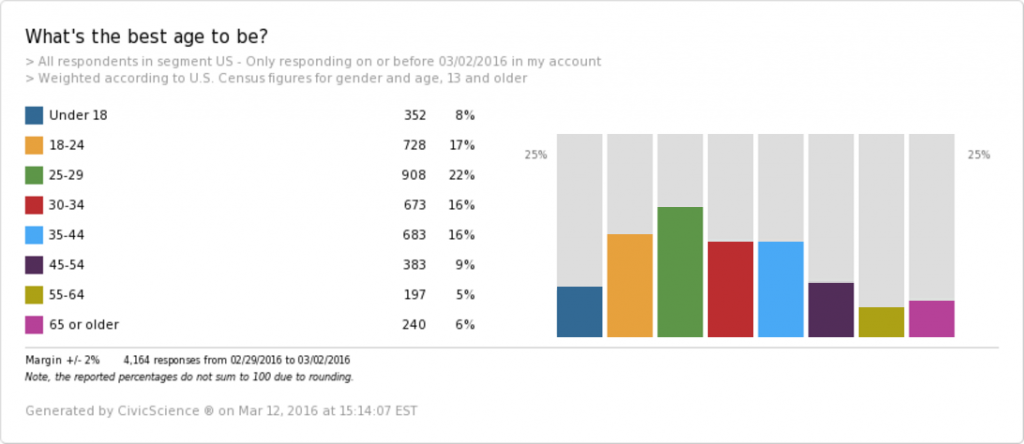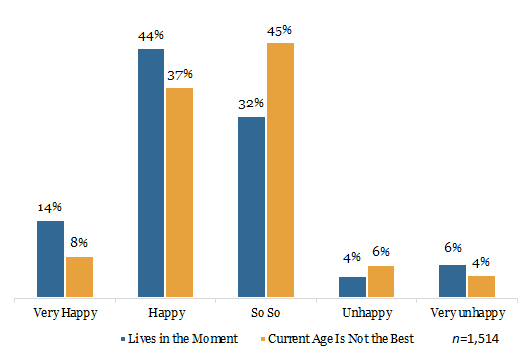Here in the U.S., a lot of us spend the first 20 years of our lives wishing to be at least one year older than we currently are. And, now that I have various joints that refuse to work properly for about the first hour after waking, I sometimes find myself wishing for the opposite. This got me wondering: What do other people think is the best age to be, and what relationship, if any, does that opinion have with their actual age?
CivicScience posed the question “What’s the best age to be?” to people all over the United States. More than 4,000 responses were gathered over three days in late February/early March of 2016:

There’s a pretty strong consensus that the best age is some time after turning 18 and before hitting 45. However, if you don’t fall into that category, despair not; more important than being a “good” age may be your attitude about your current age.
Let’s examine two different groups of people: those who answered that their current age is the best age (we’ll say these people “Live in the Moment”), and people who say an age other than their current age is the best. For example, we’ve collected a large amount of information about happiness levels over the years (see our study on happiness here), and when you compare the happiness of these two groups, the results are striking:
As many studies have shown, people who live in the moment tend to be happier.

People who live in the moment are 75% more likely to be very happy and 19% more likely to be happy. Does this mean that living in the moment makes one happier? Or are people who are happy more likely to think their current age is best? Maybe a little of both?
What else can we find out about these two different groups? We ran these groups through our system, comparing them across hundreds of different questions. The list below shows some of the notable differences. Compared to people who don’t think their current age is the best, those who are living in the moment are:
- 59% more likely to rate their current health as “very healthy”
- More likely to snack in general, but 20% more likely to choose healthy snacks like fruit or nuts
- 43% more likely to opt for organic food at every chance
- More likely to exercise, but less frequently
- They watch LESS TV, but when they do, they’re more passionate about it
- 37% more likely to be passionate about books
- 33% LESS likely to be a world traveler
- 30% more likely to follow fashion, but half as likely to consider themselves a “fashion innovator”
- More than twice as likely to use paid streaming music services and 40% more likely to use free services
- 17% more likely to be talkative at work/think out loud rather than be quiet
- 16% LESS likely to be retired, a student, or a homemaker
- 14% more likely to be outgoing in social situations
None of this implies any sort of causation, so I’m not saying that streaming an audiobook from Spotify on your bi-weekly jog and refueling afterward with an organic fruit and nut bar is going to make you appreciate your current age more. Nor am I saying that if you happen to like your age you should think that sounds like a great idea.
I guess what it means for me is that the next time I start worrying about whether that sensation in my knee is arthritis, I’ll do my best not to reminisce about “better times,” and if I need a snack, I’ll try to reach for a banana or some walnuts.
…but Cookie Monster also makes a compelling argument on that snack thing.








